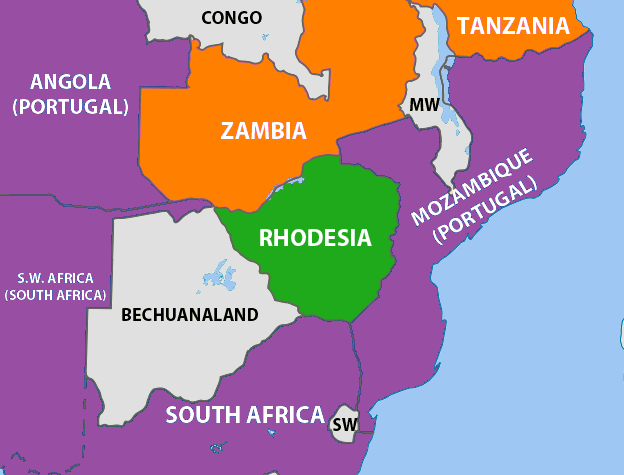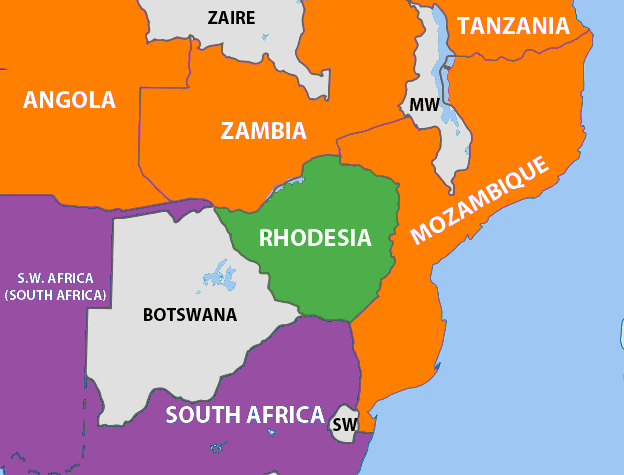Africa's forgotten cold war - Mozambican War of Independence.
With Angolans fighting for independence from Portugal on the west coast of Southern Africa it wasn't long before the Mozambican's wanted the same thing on the east coast.
As we will see Southern Africa became an increasingly troubled sub continent in the 60's and it seemed much of the world was meddling.
The Mozambican War of Independence war started on September 25, 1964.
The formation of the Mozambican guerrilla organisation FRELIMO and the support of the Soviet Union, China, Cuba, Yugoslavia, Bulgaria, Tanzania, Zambia, Egypt, Algeria and Gaddafi regime in Libya through arms and advisers, led to the outbreak of violence that was to last over a decade.
Guerrilla attacks in northern Mozambique began from bases in Tanzania. the monsoon season was a favored season in which to conduct attacks since it was harder to track insurgents by air during heavy rain and moment of ground troops was hampered by muddy conditions.
Within a couple of months the newly Independent nation of Malawi was also utilized as a launchpad or retreat after attacking the Portuguese.

By Cliftonian , CC0, Link
As conflict headed further south it is not surprising that the White minority government of Rhodesia and South Africa formed the secret pact with Portugal and assisted it in its counter independence initiatives in both Angola and Mozambique.
It was also becoming more and more common in the region that the hostilities involved cross border operations.
On June 10, 1970, a major counter-offensive was launched by the Portuguese army. The Gordian Knot Operation (Portuguese: Operação Nó Górdio) targeted permanent insurgent camps and the infiltration routes across the Tanzanian border in the north of Mozambique over a period of seven months. The operation involved some 35,000 Portuguese troops, particularly elite units like paratroopers, commandos, marines and naval fusiliers.
The Portuguese had excellent coordination between light bombers, helicopters and reinforced ground patrols. They utilised American tactics of quick airborne (helibourne) assaults supported by heavy aerial bombardments of FRELIMO camps by the Portuguese Air Force (Força Aérea Portuguesa or FAP) to surround and eliminate the guerrillas.
As frustrations began to set in, the guerrillas began resorting to mining civilian towns and roads and the Portuguese forces resorted to reprisal attacks on villages.
Reports of massacres reached Portugal and led to the wars abroad becoming more and more unpopular. Eventually it was said of the war:
"In Mozambique we say there are three wars: the war against FRELIMO, the war between the army and the secret police, and the war between the army and the secret police, and the central government."
Dissatisfaction with the wars abroad would lead to increasing dissatisfaction with the government in Portugal and would eventually lead to the Carnation Revolution and an end to both the Angolan and Mozambican War of Independence.
The peace would not last long though, within 2 years Rhodesia and South Africa would begin meddling directly in Mozambican affairs.
Without Portugal these white minority governments were becoming increasingly surrounded and isolated.

By Cliftonian, CC0, Link
Quoted parts from relevant Wikipedia pages
Other posts in this series
The piece of the cold war nobody told you about - Africa's forgotten war
The air battles
The SA Fighter Aircraft
The SA Bomber Aircraft
The conflicts deep roots and start
Regional Tensions
Africa's forgotten cold war - Angolan War of Independence.
Hey @gavvet I am from Portugal. And Regularly Follow Your POSTS. Coz, You update really interesting and Useful Information. Thanks !
Great
So much interesting information about our continent's history that I have been so far unaware of! Thank u you for your in-depth blog posts on the history of our beautiful continent <3
I grew up during a war in the country that I was born in and I read your posts and sometimes too many things are too vivid for me. That is the only reason I do not "Like" posts about war, but in solidarity with your efforts to talk about the past without a political agenda I have given an upvote here and commented for the first and maybe the last time.
I like your work here, keep it up and do not let anyone discourage you.
The truth shall set us free.
We had war too...
Fantastic post! Our part of the world has more history than most people realise...
We were isolated in a cocoon...
Awesome post, as a portuguese i love to read about this, the sad part about the independece on Angola and Mozambique was that soon after both countries went into civil wars, in Mozambique it had alot to do with racial problems i belive.
Also, the portuguese war in Guiné-Bissau was much harder and bloodier than Mozanbique and Angola, it seems strange because Guiné is much smaller, but PAIGC (guerrilla movement of Guiné-Bissau) was very strong and had massive support from Soviet Union and Cuba, including anti-air Stella systems!
@gavvet, there is a myth story about the Cubans in Guiné-Bissau and other African contries, were Che Guevara himself was present in the fights, you should do a post on that ;)
Peace, Carlos
I don't know much about Guiné-Bissau...
Perhaps you should do it then post the link here
For nearly three decades, Mozambique has experienced two particularly deadly conflicts, not only having a strong impact on its inhabitants, but also on southern Africa and beyond. Cold War. Before discussing the civil war that lasted until 1992, we must go back to the independence struggle, a colonial conflict that lasted from 1964 to 1975.
following you
Very interesting topic mate... I have family that lives in Portugal.
@gavvet
You bring back memories of my visits to Mozambique 🇲🇿
Though no one will discuss freely the war and guerilla history, we can still feel the undercurrents of various factions in the corridors of power there. I had tried to read up on the history and was aware of the Gordian knot operation but did not know details. It was difficult to piece together the history and I found that for an outsider like me, correlating that history with current politics was not an easy job.
Your article, however does an excellent job to summarise.
Thanks for sharing. Upvoted
I have put up couple of funny wildlife blogs ( my funny bone seems to be acting up 😀😀). I request you to take a look if you have time. Your comments would be very welcome. Thanks.
All the wars in africa is because the Diamand, and i see that no one in africa have made anything because so many coming from everywhere in the world they xchange Diamand with guns and they make the wars @gavvet
This comment has received a 0.15 % upvote from @booster thanks to: @hamzaoui.
good